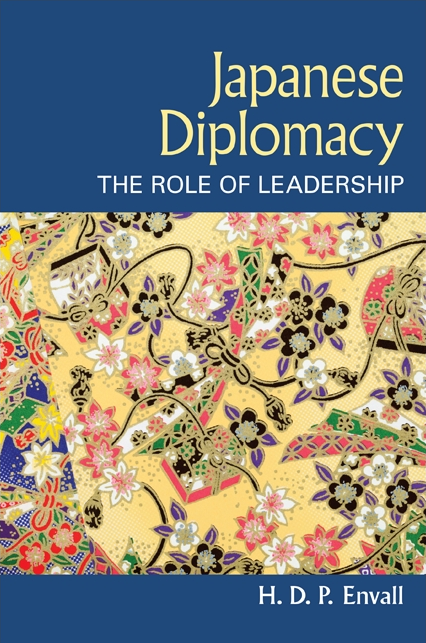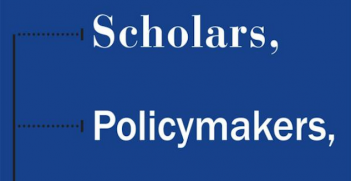Japanese Diplomacy: The Role of Leadership

David Envall belongs to a new generation of Australian scholars specialising in the study of the political and international dynamics of Australia’s Asian neighbours; in his case, Japan. Envall speaks and reads Japanese, has worked in a Japanese university environment and has lived in Japan for some time. This book examines Japanese leaders objectively, using the same framework as for other democratic leaders and intelligently recognises the constraints that domestic political environments inevitably impose on leaders. He develops useful case studies for his three primary leaders – Ohira Masayoshi, Suzuki Zenko, and Nakasone Yasuhiro – but also covers the leadership of some other high-profile prime ministers such as Tanaka Kakuei and Koizumi Junichiro.
This is essentially a theoretical study in international relations rather than in political science. Envall describes his methodology as foreign policy analysis, which ensures that ample attention is paid to the various foreign policy issues that these prime ministers encountered. However, surprisingly little space is devoted to Asian regionalism, where prime ministers such as Miki Takeo, Fukuda Takeo and Ohira Masayoshi each displayed leadership in their day. It is not clear to what extent he supplements this analysis with interviews but there is no mention of interviews with any of the key Japanese foreign policy advisors still living, such as Owada Hisashi (member of the International Court of Justice), Okazaki Hisahiko (now head of his own think tank) and Okawara Yoshio (a former ambassador to Australia). One of the author’s central propositions is that political leadership in foreign policy is significantly influenced by the domestic environments in which it operates and he successfully demonstrates this in respect of Japanese Prime Ministers.
In my career as an Australian diplomat, I saw a number of Japanese Prime Ministers in action, starting from Sato Eisaku and including Koizumi Junichiro. Envall certainly under-estimates Sato, who not only was a long-serving prime minister (1964-72) but who also successfully managed some significant foreign policy challenges such as the reversion of Okinawa in 1971 and the normalisation of relations with Korea in 1965 and was the co-winner of the Nobel Peace Prize in 1971- the only Japanese Prime Minister to be honoured in this way. Some readers may also be surprised by Envall’s omission from any detailed analysis of later prime ministers with known foreign policy track records, such as Miyazawa Kiichi – whose English was good enough for him to communicate directly and comfortably with the other heads of government; or Hashimoto Ryutaro, who attended summits not only as prime minister but also in other ministerial capacities where his economic reforming credentials became famous; or even Fukuda Takeo, who actively supported Japanese aid to Southeast Asia in the 1970s.
Envall’s focus on the role of prime ministers at the G-7/G-8 summits denies due recognition to displays of leadership outside the summits, such as Ohira’s role as co-founder of APEC, a role which is not mentioned. The G-7/G-8 summits do not necessarily provide a level playing field in the sense that any leaders not confident in English would be at some disadvantage; this was certainly the fate of most Japanese prime ministers, with the possible exception of Miyazawa Kiichi. (As Envall correctly points out, Miyazawa’s leadership was seriously undermined by the unfavourable domestic political situation he faced, beset as he was with corruption scandals.)
While Envall does not ignore the importance of a leader’s personality, he surprisingly plays down the strength of Nakasone’s personality in accounting for his success as a leader. Moreover, his assessment that Suzuki’s leadership was enhanced by his ‘indispensability’ strains credibility for anyone who knew Suzuki at the time as a political and policy lightweight and someone who became prime minister ‘by accident’ when Ohira Masayoshi died in office. His low rating for Prime Minister Ohira does not take much account of the latter’s untimely death while in office, before he had had the opportunity to fully play out his prime ministership.
Envall does an impressive job in placing his study of Japanese leadership and diplomacy in the framework of international studies. While this is primarily a theoretical study, the author seeks to ground it against practical political forces affecting policy-making in Japan at the times. He does not make it clear to what extent, if any, he used interviews, although whether or not this might have changed any of his judgements is not apparent.
David Envall, Japanese Diplomacy: The Role of Leadership, State University of New York Press, 2015.
Trevor Wilson is a Visiting Fellow at the Department of Political & Social Change, College of Asia & the Pacific, Australian National University. He spent 12 years living and working in Japan as an Australian diplomat and speaks and reads Japanese. This article may be republished with attribution under a Creative Commons Licence.





